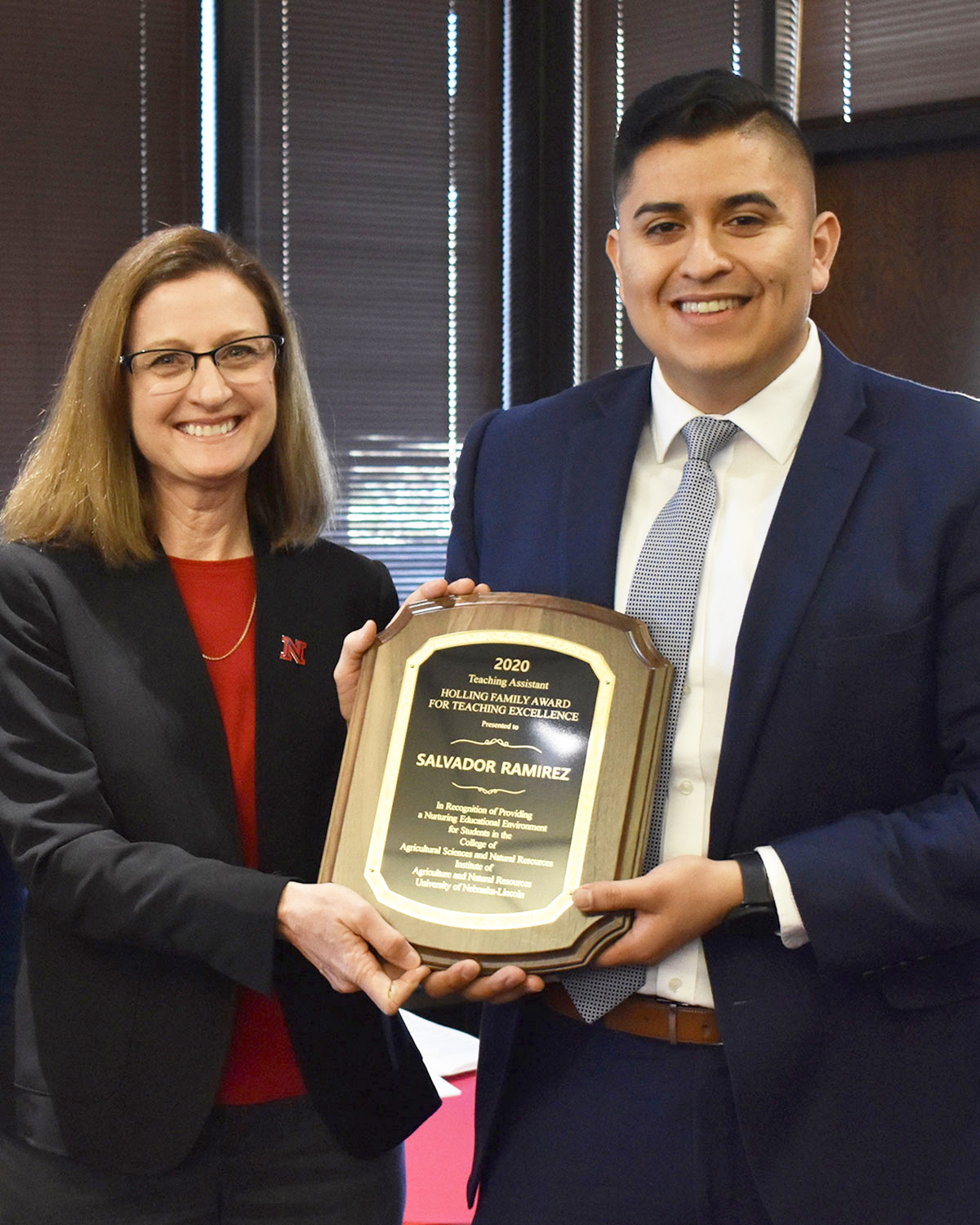
Salvador Ramirez, an agronomy doctoral candidate in soil and water sciences, was honored with a Holling Family Teaching Assistant Teaching Excellence Award March 11 at the Nebraska East Union. The award was one of 10 Holling Family Awards for Teaching Excellence given to Institute of Agriculture and Natural Resources senior faculty, junior faculty and teaching assistants this year.
The Teaching Assistant Teaching Excellence Award recognizes students who are currently in graduate degree programs under the supervision of IANR faculty members involved with agricultural sciences and natural resources. The award emphasizes imaginative and creative teaching efforts in carrying out IANR educational programs.
Ramirez has been investigating what fascinates him most — soil microbial communities and the role they play in production agriculture. Rhae Drijber, professor of agronomy and horticulture and researcher in soil microbial ecology, advises him.
He’s been a TA for five years for courses including Agronomy 426 Invasive Plants, Science Literacy 101 Science and Decision-Making for a Complex World, Agronomy 366 Soil Nutrient Relationships, and Agronomy 153 Soil Resources.
According to Ramirez, Jenny Dauer, associate professor in natural resources; Meghan Sindelar, assistant professor of practice in agronomy and horticulture; and Martha Mamo, professor and head of the Department of Agronomy and Horticulture, have taught him how to teach.
“They enhanced my ability to communicate my science to peers, students, farmers and the general public,” Ramirez said. “Those same individuals also provided an example of the kind of leader I want to be.”
“In all classes, Sal has a role of leading recitation or lab sections,” said Sindelar, who nominated him for the TA award. “He does this with great enthusiasm and has successfully guided students in each course through creative thinking and problem-solving exercises.”
According to Sindelar, not only does Ramirez enjoy being in the classroom and sparking curiosity in students, but he’s passionate about sharing his ideas and successful classroom techniques with others.
Ramirez is currently assistant teaching Soil Resources online with Rebecca Young, assistant professor of practice in agronomy and horticulture. At the same time, he’s writing his dissertation on the impact of tillage, residue removal, crop rotations and nitrogen fertilization on soil biological properties in Eastern Nebraska.
He says not much has changed for him since the university went from face-to-face to online classes during the COVID-19 pandemic.
“I miss teaching in person, but online has been okay, he said. “Dr. Young has done a fantastic job switching to online teaching and leading us through this time, by setting up our labs and Zoom meetings.”
Ramirez says classes have changed more for the students. Many of them struggle to adapt to online platforms for different reasons — having access to reliable internet, managing school while being home with family, and working more hours than usual in their respective jobs.
He often finds himself meeting on Zoom with students at odd hours since they can’t always make it to the online labs. He does this because he cares and he wants to make sure the students still get the assistance they need. He knows what it’s like, being a graduate student himself.
“Sal excels at keeping groups motivated and encourages them to think outside the box,” Sindelar said.
Ramirez completed the Doctor of Plant Health program in May of 2019 and currently plans to defend his thesis in agronomy in June.
The Holling Family Award Program for Teaching Excellence was made possible by a gift from the Holling family to honor their pioneer parents. John Holling was a 1912 electrical engineering graduate of the University of Nebraska–Lincoln and his brother, Gustave Holling, attended the College of Agriculture before farming the family’s land in the Wood River Area.
Fran tenBensel Benne | Agronomy and Horticulture
More details at: https://go.unl.edu/hollingaward